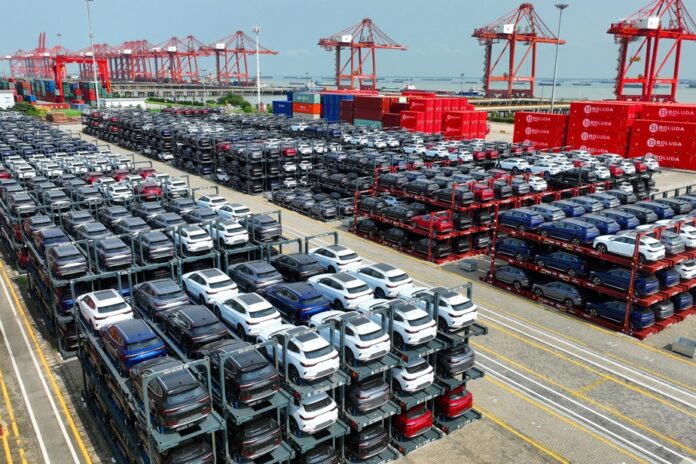(Santiago de Compostela) The European Union displayed its unity against Beijing on Friday, showing itself ready to continue its investigation into Chinese subsidies for electric cars despite the threat of retaliation agitated the day before by the Asian giant.
“I am confident,” said the European Commissioner for the Economy, Paolo Gentiloni, when asked about the risks of seeing the world’s largest economy punishing European companies.
“We need to treat this problem seriously. There is no specific reason for retaliation, but retaliation is always possible in these kinds of cases,” he said at a meeting of EU20 economy and finance ministers. Seven, in Santiago de Compostela (northwest of Spain).
The President of the European Commission Ursula von der Leyen announced on Wednesday the opening of an investigation into Chinese public subsidies for electric automobiles, in order to defend the European industry in the face of prices deemed “artificially low”.
If, at the end of its investigation, the Commission finds violations of trade rules, it could impose punitive customs duties on Chinese vehicles, at the risk of triggering a trade war with Beijing.
This measure “taken in the name of “fair competition”” is “openly protectionism” and it “will have a negative impact on economic and trade relations between China and the European Union,” the Chinese ministry replied on Thursday. Trade.
Trade with China represents less than 2.5% of the gross domestic product (GDP) of the euro zone, Paolo Gentiloni put things into perspective on Friday, while recognizing that the situation was “very diverse” depending on the member states.
France has been pushing in recent months for a Europe that asserts itself more in the face of suspicions of protectionist measures from China. Germany, whose Chinese market is essential for its automobile industry, is traditionally more reserved.
But, in this case, it also assumes the risk of offending Beijing.
“If there are doubts about fairness, they need to be investigated. Global trade is based on rules and (they) naturally also apply to electric vehicles,” German Finance Minister Christian Lindner stressed on Friday.
China represents the largest global market for major German car brands such as Volkswagen, Audi, Mercedes and BMW. It is also the primary outlet for French luxury giants LVMH, Kering and Hermès.
But, with its nearly 450 million inhabitants, Europe appears sure of itself.
“I think the EU is a global commercial superpower,” said Spanish Economy Minister Nadia Calvino, whose country has held the rotating presidency of the EU Council since July.
“We have every interest in having a rules-based trade framework that avoids any measures that could weaken or jeopardize the level playing field between businesses around the world,” she said. declared.
“We just want everyone to play by the same rules. That’s all. It is not against China which is an important economic partner for Europe,” stressed French Minister Bruno Le Maire. With this investigation, the EU simply wants to “defend the interests of its companies,” he said.
Experts estimate the cost advantage of Chinese vehicles over European competition at around 20%.
But where Brussels suspects illegal practices, Beijing simply believes it is reaping the fruits of its investments.
China has long relied on electric engines in automobiles and has taken a lead over Europe, particularly in battery technologies.
Its manufacturers rely on their immense domestic market to now develop abroad, thanks to the strong economies of scale from which they benefit.
Dozens of innovative local brands have emerged in recent years in China (BYD, Geely, XPeng, Nio, Leapmotor) and they compete with foreign manufacturers who are struggling to adapt.
Still unknown to the general public in Europe, Chinese brands were present in large numbers this year at the Munich motor show in Germany at the beginning of September.
“This is a competitive advantage acquired through hard work” and “the result of uninterrupted technological innovation,” the Chinese Ministry of Commerce said on Thursday.















